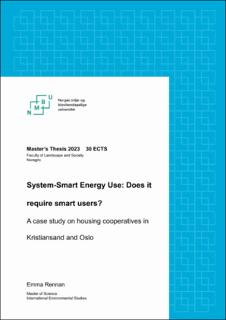| dc.description.abstract | Housing cooperatives are a crucial component of Norway’s housing stock, accounting for approximately 20% of total housing units. As a result, decision-making processes in housing cooperatives significantly impact the country’s energy consumption patterns. This thesis explores contextual and internal factors, including perspectives on economy, complexity and environmental norms and values, which may influence the adoption of “system-smart energy” solutions. System-smart energy refers to various technologies and practices that enable efficient energy use and reduce environmental impacts, such as renewable energy sources, energy-efficient appliances, and smart grid systems. The study applied theoretical underpinnings related to behaviour from institutional
economics. It used the Environmental Governance System framework (EGS) to map the institutions and actors with which housing cooperatives interacted. The research objectives included clarifying the concept of system-smart energy solutions, investigating the impact of relationships between actors, structures, and institutions on housing cooperative success, identifying enablers and barriers to investing in system-smart energy solutions, understanding decision-makers motivation for collaboration and partnership, and investigating factors shaping housing cooperative decision-making regarding smart energy systems. Overall, this study aims to understand better the role of system-smart energy solutions in housing cooperatives and the factors influencing their adoption and success. The research highlights the challenges decision-makers face in housing cooperatives navigating the complex landscape of smart energy solutions. Through shedding light on decision-makers' perspectives in housing cooperatives, as framed within the formal and informal institutions external and internal to the housing cooperatives, this study provides valuable insights that may inform policymakers, energy service providers, and housing cooperatives in achieving energy goals and a successful energy transition. Specifically, the research underscores the importance of taking a comprehensive approach that considers the interaction of different energy systems and the critical role of actors, structures, and institutions in implementing smart energy solutions. | |
